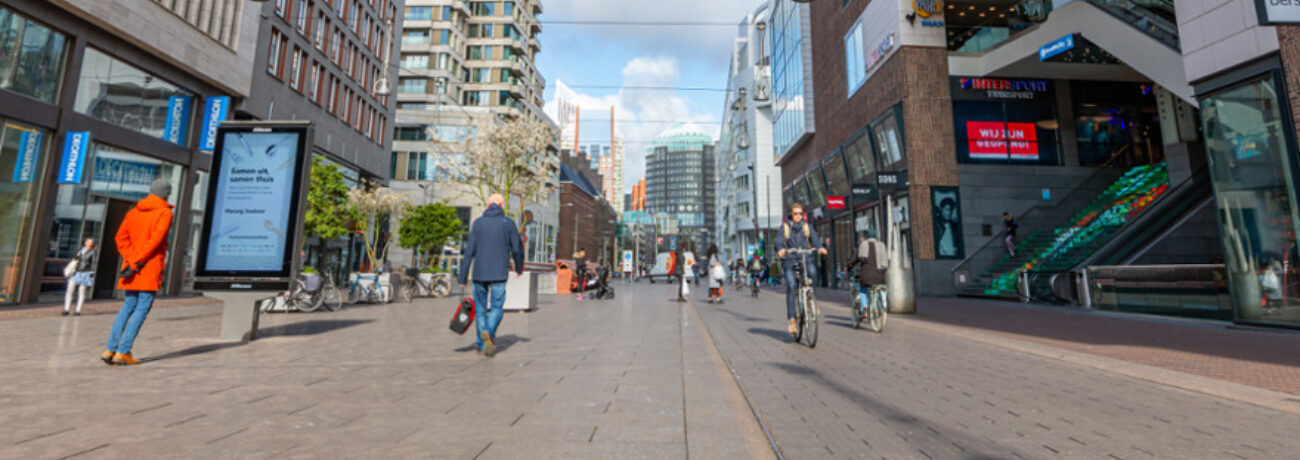Health Campus The Hague: working together for better health and care
Better health for all the residents of The Hague region. This is the mission of Health Campus The Hague – formerly LUMC Campus The Hague. Eight partners – the LUMC, Leiden University, the municipality of The Hague and five healthcare institutions (see box) – are collaborating intensively in healthcare education and research. Their aim is to reduce health disparities among residents.
In recent years, the collaboration between the LUMC, Leiden University and the healthcare partners has expanded and the former name no longer reflects its present status, explains Professor Mattijs Numans, Director of Health Campus The Hague. ‘The role of the partners is becoming more and more important.’ The new healthcampusdenhaag.nl website contains all the relevant information about the collaboration and what this means for the residents of The Hague region.
Health Campus The Hague is a collaboration between the LUMC, the Faculties of Social and Behavioural Sciences, Governance and Global Affairs, and Science at Leiden University, the municipality of The Hague, the Haaglanden Medical Centre, Haga Hospital, Reinier de Graaf Hospital, the Haaglanden Municipal Health Service (GGD), Parnassia Group and HADOKS (the General Practitioners organisation in the Haaglanden area).
Benefits of the collaboration
The collaboration started in 2016 with the aim of offering residents more innovative healthcare and making it possible to conduct more interdisciplinary research. Education is also an important element: besides working in partnership with the GP training, Health Campus The Hague also offers such programmes as the master’s in Population Health Management, courses, summer schools and conferences to ensure that the knowledge and experience gleaned is shared as widely as possible.
Inequalities in wellbeing and health
The Hague region has typical metropolitan problems such as complex health and care issues and large disparities in wellbeing. Traditionally, there are also large differences among the residents. In some Hague districts, obesity and diabetes are much more common and life expectancy is lower. Health Campus The Hague investigates these differences and aims to provide solutions.
Emergency care
GPs and hospitals flag up all kinds of problems that they are unable to investigate themselves, explains Egbert Vos, programme director of Health Campus The Hague. 'Our researchers can pick up those issues in cooperation with the hospitals and other partners.' One issue raised by hospitals is that many patients never – or hardly ever - go to a GP, and only report to the Emergency Departments when their complaints have reached a serious level. Researchers are looking at how severe health problems can be prevented and how patients can be encouraged to visit a GP sooner. Prevention of health problems is also a key part the collaboration with Healthy and Happy The Hague, and the role played by socio-economic and cultural differences is being investigated.
From lifestyle to data-expertise
Besides LUMC, three other faculties are also part of Health Campus The Hague. Scientists from the Faculty of Social and Behavioural Sciences, for example, investigate issues in the field of behaviour, health, prevention and lifestyle. Researchers from the Faculty of Governance and Global Affairs look at the management aspects of healthcare, and mathematicians from the Faculty of Science provide the data expertise that makes the data side of the major research studies possible.
Sharing data
All the partners, such as hospitals and healthcare institutions, have huge amount of data, but previously this data was never adequately shared and linked, Vos explains. Now, while still guaranteeing patient privacy, all parties have ready access to each other's data in a secure CBS environment. That makes it easier to trace particular problems, and allows for a more targeted approach. Naturally, all patients can object to their data being shared with the partners in the collaboration.
Partnership still growing
The collaboration is still growing and more partners such as knowledge institutions and healthcare organisations will be joining, Numans says. Health Campus The Hague is located in the Wijnhaven building in The Hague, but the Campus actually extends across the entire region because of all the partnerships. Numans and Vos stress that the knowledge acquired will not just stay here. Numans: 'We hope we can translate the lessons and insights we gain to the rest of the Netherlands.' Vos: 'There’s also a lot of international interest in all the research and in this unique and fruitful collaboration.'
In January 2023, Health Campus The Hague will hold its annual working conference, focusing on the projects that show all the partners working together with residents to create a healthier region.

